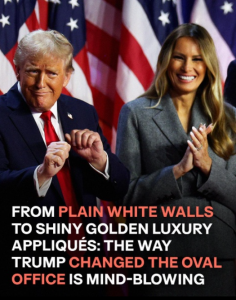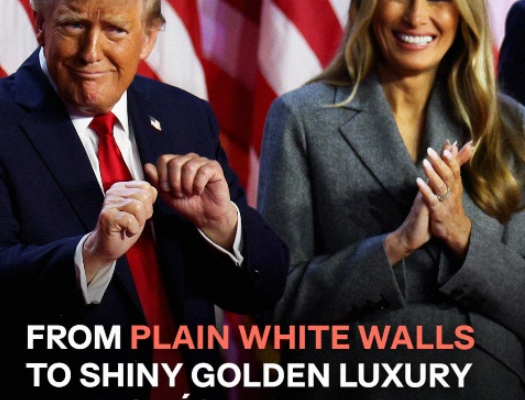
Donald Trump Faces Awkward Situation at White House Gathering
At a recent high-profile event inside the White House, former President Donald Trump found himself in an unexpectedly awkward situation that quickly made global headlines. The gathering was meant to highlight diplomatic unity and celebrate ongoing cooperation between the United States and Australia, yet it ended up becoming the talk of the political world for reasons that had little to do with policy.
The occasion took place in the elegant Cabinet Room, where Trump met with Australian Prime Minister Anthony Albanese and other officials to discuss bilateral trade, defense partnerships, and a new rare-earth minerals agreement. Cameras were rolling, aides were smiling, and everything appeared to be proceeding smoothly. But as the conversation turned to the topic of international relations, Trump made a series of remarks that shifted the tone of the meeting and set off a wave of reaction both in Washington and abroad.
Sitting among the delegation was Kevin Rudd, Australia’s ambassador to the United States and a former prime minister. Rudd has been known for his outspoken criticism of Trump during past years, having once described him as a “destructive and divisive leader.” Many diplomats assumed that the two would keep their interaction polite and professional for the sake of optics. However, Trump’s trademark candor would not allow that.
When an Australian journalist brought up Rudd’s earlier remarks, Trump paused, squinted toward the press section, and said, “I’ve heard that this man said some very bad things about me. Is that right?” Turning toward Albanese, he continued, “Do you still have him working for you?” The Prime Minister, caught off guard, smiled uneasily and gestured toward Rudd, who was sitting only a few feet away. That’s when Trump, with a half-smile, leaned forward and said, “Well, I don’t like you either, and I probably never will.”
The room fell silent for a moment. Reporters shifted in their seats, and aides glanced nervously at one another. Then, as Trump chuckled and waved his hand dismissively, light laughter broke out, easing some of the tension. Yet the exchange was caught on every camera in the room. Within minutes, clips began circulating online, and headlines declaring “Trump Tells Australian Envoy ‘I Don’t Like You’” appeared across major news outlets.
Diplomatic analysts described the moment as both humorous and risky. On one hand, Trump’s blunt style has long been part of his political persona—his supporters view it as proof that he’s unafraid to speak his mind. On the other hand, critics argued that such remarks, especially during a formal state meeting, risked undermining the carefully crafted image of unity between the two allied nations.
Despite the awkwardness, both Trump and Albanese pressed on with the meeting. The focus returned to discussions about the AUKUS defense pact, trade relations, and cooperation on critical minerals needed for clean energy technology. Officials from both countries later emphasized that the incident had not affected the talks. A White House spokesperson even brushed off questions about it, calling it “a light-hearted moment between friends.”
Still, political commentators could not resist analyzing what the exchange revealed about Trump’s leadership style. For many observers, it illustrated once again how his personal feelings often intersect with his professional conduct. In traditional diplomacy, leaders tend to avoid any comment that could be seen as disrespectful toward an ally’s representative. Trump, however, operates by different rules—preferring spontaneity, humor, and directness over rigid formality.
Some Australian media outlets speculated that Trump’s remark might have been an attempt at humor rather than hostility. One columnist noted that his tone was “more teasing than confrontational,” pointing out that even Rudd appeared to smirk after the comment. Nevertheless, the optics were difficult to manage. In a country where diplomacy thrives on courtesy, such moments are inevitably magnified.
In the days that followed, social media users turned the exchange into a viral sensation. Memes, jokes, and edited videos flooded the internet, with captions like “The most honest moment in diplomacy” and “When the President speaks from the heart.” Late-night talk shows replayed the clip repeatedly, and commentators debated whether Trump had once again succeeded in dominating the news cycle through sheer unpredictability.
Behind the humor, however, lies a more serious question about how such behavior influences U.S. relations abroad. Diplomatic experts noted that while Trump’s straightforwardness appeals to some allies who appreciate clear communication, others find it unsettling. The challenge for foreign diplomats, they argue, is learning how to navigate these unpredictable exchanges without letting them derail the substance of ongoing cooperation.
For the Australian government, the priority was damage control. Prime Minister Albanese downplayed the moment, insisting that the U.S.–Australia partnership remained “strong and resilient.” Rudd himself, when later asked about the comment, reportedly laughed and said, “Diplomacy sometimes includes a sense of humor.” His response helped defuse tensions and allowed both sides to move forward.
The meeting ultimately concluded with the signing of several cooperation agreements, including initiatives to boost mineral exports and enhance defense collaboration. Yet the media’s focus remained largely on the earlier exchange, demonstrating once again how personality often overshadows policy in modern politics. For many observers, it was a classic Trump moment—unfiltered, headline-grabbing, and impossible to ignore.
Those close to Trump said that he viewed the incident as inconsequential. According to aides, he even joked about it afterward, saying, “At least everyone paid attention.” This remark encapsulates how Trump sees communication: not as a delicate art, but as a performance. He thrives on reaction—positive or negative—and understands that in today’s media landscape, visibility often matters more than perfection.
Political scientists observing the episode pointed out that Trump’s approach reflects a broader shift in international relations. The era of carefully scripted diplomacy, they argue, is giving way to one in which personality politics dominates. Leaders now communicate directly with the public through candid moments that humanize them, even if they sometimes spark controversy. In that sense, Trump’s awkward moment may be less a misstep and more a deliberate strategy.
As for public reaction within the United States, opinions were sharply divided. His supporters praised him for “saying what others only think,” arguing that his frankness demonstrates authenticity and confidence. Critics, however, saw it as another example of undisciplined behavior that risks embarrassing the nation on the global stage.
In the end, what could have been a forgettable diplomatic gathering turned into a defining media story. For the Trump team, the aftermath may not have been entirely negative. The viral attention kept him in the headlines, reinforcing his image as a leader who defies convention. For the Australian delegation, it was a reminder that in dealing with Trump, one must always expect the unexpected.
Ultimately, the incident underscored the delicate balance between personality and politics in international affairs. While the substance of U.S.–Australia relations remains strong, the episode will likely be remembered less for the agreements signed and more for the words exchanged. In an era where every comment is recorded, replayed, and analyzed worldwide, even a passing remark can echo far beyond the walls of the White House.

